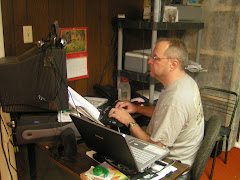Friday, July 27, 2007
Saturday, July 7, 2007
Epiphanies of a Personal Sort
Of course, what is a dentist office without dentist-office music, and this was no exception. Dr. C. and I had co-stared together in a production of Brigadoon some years back, he as the romantic guy, me as the funny guy, he getting the girl, I getting the laughs, he getting to sing, I getting to..., well, I did get to sing two lines, but it was for comic effect, and not because of the beauty of my performance. Dr. C., on the other hand, has a beautiful, clear, tenor voice. Like many tenors, he was a bit stiff on stage..., but I digress. In the years I had visited his office every six month, I had always heard Brigadoon-like music, easy-listening favorites, as it were. It bespoke his personality and nature, and, like it or not, that kind of music does have a soothing effect so handy in a dentist=s office.
The repertoire today, however, was definitely not easy listening; emerging from the ceiling speakers were the unmistakable twangs of Country Music. The surprise at this very uncharacteristic phenomenon, (and the fact that the new hygienist was blonde, very cute, and vivacious), served to stir me from my morning torpor. When she mentioned that on a gorgeous, warm, autumn morning like today she would rather be out riding one of her two horses, I knew the source of the radio station selection. She reported that at first the Doctor had always switched it back to his station whenever she had changed it while working alone, but lately he had just let it be. When I asked him about it, he blamed his teenage son, who had been conscientiously introducing Country to him at home. I suggested he rent a video of the first making of Invasion of the Body Snatchers, but my point was lost, and, as we all know, explaining a joke takes all the joy out of it.
This exchange came at the end of my session. It was while I was driving away that I encountered my own epiphanal experience. It was Beim Schlafengehen from Richard Strauss' Four Last Songs, playing from my car radio, and specifically that transcendently beautiful moment when the soprano, in the last lines of Hesse's lyric, describes the soul, soaring free in the magic circle of the night, echoing the exquisitely sublime solo violin melody that separated the second from the third verse. Was it the strident contrast between this ethereal beauty and what I had been listening to before? I am not sure, but it struck my forcefully. I actually felt incipient tears welling up.
The dictionary tells us that an epiphany, of whatever nature, involves a sudden manifestation of the essence or meaning of something. My realization was that at rare and, for the most part, unpredictable times, the human organism finds a way to break free from its normal, routine, humdrum existing to make contact with some ethereal higher state of being or consciousness to create something that stands as a Colossus to bestride the narrow world of petty inventions. What is the process here? If I knew I would avail myself to it and rise to greatness. There are, in each generation, some few who tap into this creative power, that seems to hover and brood over the world as a sort of cosmic Zeitgeist. The rest of us catch occasional glimpses, but more often than not are not prepared to act on them, only to enjoy.
Mozart possessed the gift of an open hot-line to this infinite intelligence, and it flowed through him like waters of life. Beethoven had to work for his, but with an awe-inspiring will power, a magnificent will to create, he forcibly wrested creative power out of the infinite and opened his minds to vistas most people cannot even dream of. The results are similar. Mozart gives us the achingly beautiful adagio to his Clarinet Concerto, seemingly effortlessly as it wafted into his creative subconscious. Beethoven offers the otherworldly rapture of his "Heiliger Dankgesang:" we know right away who was the one recovering and offering thanks to Divinity. However much we feel it upon listening, Beethoven felt it more deeply.
There are other epiphanies in music (and so many more in creative arts outside music): In twenty years of listening, I still cannot listen to the final chorus, the last few bars of Mahler's "Resurrection Symphony" without feeling chills as the hairs on the back of my neck rise in exultation. I experience much the same whenever I hear the chorale of the shepherds choir bringing peace after the tumult of rejoicing in Respighi's "Laud to the Nativity."
Therein lies a lesson: the profound and the beautiful need not be obscure. One might say, sadly, it usually is.I choose to omit the sadly, because it is ever so. Thoreau wrote, pessimistically, The mass of men lead lives of quiet desperation. If this is true, it is because most men and women rarely look outside themselves. Many people become so focused on the self through conditioning and their manner of reacting to what life dishes out, that they see only unclearly what is beyond them. Those prophets, the creative artists, are exactly that, because they have mastered the technique of looking and feeling, and grafting themselves onto the Universal Infinite Intelligence that gives a so much more great and noble view of life and the world. Those who follow them toward the light, find that the light is good, and as they receive it, their capacity to receive increases continually; their ability to find insights and find the most profound joy grows.
This quest for creative insight is, of course, not the sum of our purpose. An obsession here could cause a person to become an artistic hermit, out of balance with the total self. Again, we can take a lesson from the great artists. Their life was spent in our service. They created for us.
Whatever else happens in our life, we are in this all together, and are one, like it or not. A Schubert, like Mozart pulling magnificent ideas out of the ether, or a Mahler, struggling Beethoven-like to comprehend all things before putting it into music, enlighten and elevate us all. If we follow, our own power to elevate may increase. At the least, we will ourselves be drawn upward toward higher planes of existence.

